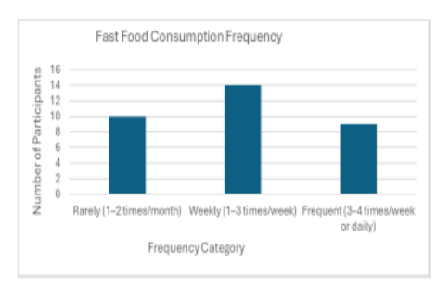
Journal of Nutrition Research
An official journal of IAPEN India association




Journal of Nutrition Research
DOI: 10.55289/jnutres/v13i1.25.40
Year: 2025, Volume: 13, Issue: 1, Pages: 26-30
Original Article
Sagar Bayaskar1∗
1Independent Public Health Researcher, 444902, Maharashtra, India
*Corresponding Author
Email: [email protected]
Received Date:30 May 2025, Accepted Date:02 August 2025, Published Date:23 August 2025
The rising prevalence of mood disorders among young adults has been linked to lifestyle factors, including dietary habits. This study explores the relationship between fast food consumption and mood disorders through in-depth interviews with 35 young adults (aged 18–45) from diverse educational and occupational backgrounds. Using a qualitative approach, semi-structured interviews were conducted to assess the frequency of fast food intake, its immediate and long-term effects on mood, and the impact of reducing consumption, alongside contextual factors such as screen time and sleep quality. Thematic analysis revealed that frequent fast food consumption (weekly or daily) was consistently associated with negative mood outcomes, including lethargy, irritability, and guilt, reported by over 60% of participants. Notably, 80% of participants who reduced fast food intake described improved mood and energy, citing enhanced mental clarity and emotional stability. High screen time and disrupted sleep patterns emerged as compounding factors, exacerbating negative mood effects, particularly among students in high-stress fields like neuroscience and medicine. An interesting finding highlighted students’ dependence on fast food driven by academic pressures, correlating with pronounced mood disturbances. These findings underscore the interplay between dietary habits, digital lifestyles, and mental health, suggesting that interventions promoting balanced nutrition and digital wellness could mitigate mood disorders in young adults. Further research should explore longitudinal effects and targeted dietary interventions to support mental well-being in this population.
Keywords: Fast food consumption, Mood disorders, Young adults, Dietary habits, Qualitative research, Sleep quality, Lethargy, Nutritional psychology, Academic stress, Lifestyle factors
© This is an open-access article distributed under the terms of the Creative Commons Attribution License, which permits unrestricted use, distribution, and reproduction in any medium, provided the original author and source are credited.
Published By India Association for Parenteral and Enteral Nutrition (IAPEN)
Subscribe now for latest articles and news.